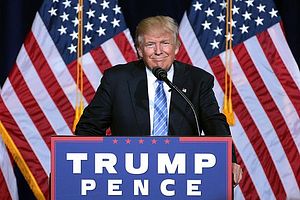The suspense is over. On November 8, defying most predictions, Donald Trump was elected to be the 45th president of the United States. Regardless of their pre-election desires and preference, U.S. allies and partners in the Asia-Pacific region will be working with President Trump at least for the next four years.
Before November 8, the concerns Asia-Pacific leaders had about the next U.S. administration revolved around to what extent the new president will adjust the Obama administration’s Asia-Pacific rebalance strategy. With the incoming Trump administration, Asia’s leaders are now faced with an entirely different set of questions — will the United States under Trump be even interested in remaining engaged in the Asia-Pacific region?
Of course, there is a strong case to be made in support of continuing U.S. engagement in the Asia-Pacific region. The Trump administration will continue to face an Asia-Pacific region whose security environment is more uncertain with rising influence of China, an increasingly belligerent and unpredictable North Korea, and long-standing alliances and partnerships in Southeast Asia in flux due to the developments in the region. Given Beijing’s increasingly explicit attempt to challenge the United States’ leading position in the region, the case for sustaining, or even re-vitalizing, U.S. engagement in the Asia-Pacific region sounds like a no-brainer if President Trump wants the U.S. to keep playing a leadership role in this region.
However, given what candidate Trump said about U.S. engagement in the world during the campaign, it is simply an unknown whether President Trump, once in the position to govern, will significantly alter his views, let alone his position.
Particularly in the last two years, the global security environment has entered a period of uncertainty, justifying Trump’s campaign rhetoric on “making America great again” by focusing on the challenges at home, asking allies abroad to bear more responsibility, and revising all of Washington’s international commitments, including the decades-old alliances, from a clean slate. In the Middle East, continuing diplomatic gridlock in Syria deepens the tensions that already exists within the country, calling into question the efficacy of continuous U.S. involvement. Islamic State (ISIS) and ISIS-inspired groups and individuals continue to pose grave security concerns. Russia’s assertive behaviors, which often run counter to U.S. intentions, ushered a period of renewed uncertainty in Europe. This has resulted in the United States having serious conversations with its NATO allies regarding readjustment of the force posture in Europe to ably counter pressure from Russia in the Eastern front. Taken together, all these developments present a powerful case that the U.S. may be well advised to regroup and reprioritize its foreign and national security priorities.
It would certainly be premature to think that the Trump administration, despite what President Trump may wish, could immediately overhaul U.S. policy based what has been said on the campaign trail. Regardless of pre-election rhetoric, it will be extremely difficult to undo the institutions, such as alliances, that have been carefully developed over the last several decades. In the area of national security, the United States is already pursuing greater burden-sharing with its allies, a shift from what critics saw as the overextension of the U.S. military during the preceding Bush administration. However, with the United States being pulled to turn inward, consultations between the U.S. and its allies around the world can change considerably under the President Trump.
What might a Trump presidency mean for the Asia-Pacific region? First and foremost, it will mean that U.S. allies and partners in the region may no longer be able to count on the kinds of the reassurance about Washington’s security commitment that they have grown used to. While such assurance may still be coming, there may be a greater pressure from Washington for countries in the region to bear a much greater burden not only for their own defense but also for regional security, possibly including spending more on their national defense. Second, many of the Obama administration’s legacy achievements in the Asia-Pacific region, from the Asia-Pacific rebalance to the Trans-Pacific Partnership (TPP), will be increasingly in flux. This will put many governments, particularly those which hoped to leverage TPP to push their own economic reform agenda at home, in a very difficult position. Finally, a Trump presidency will put greater uncertainly in the minds of some leaders in the region over how to balance their relationships with the United States and China. Simply put, no matter how you look at it, a Trump presidency will instill a much greater sense of uncertainty — even anxiety — in U.S. allies and partners in the Asia-Pacific region.
Once President-elect Trump unveils his appointments for the key national security positions, U.S. allies and partners around the world, including those in the Asia-Pacific region, can begin to gauge the foreign and national security policy of the new administration. Whether they will see such appointments with a sigh of relief or with even greater concerns is still an open question.

































